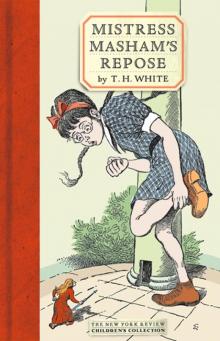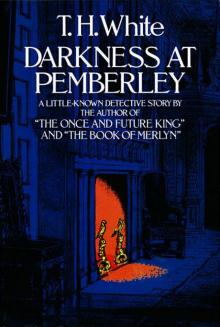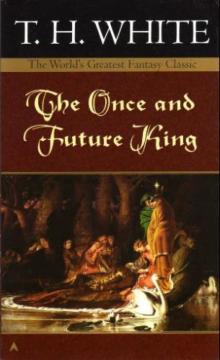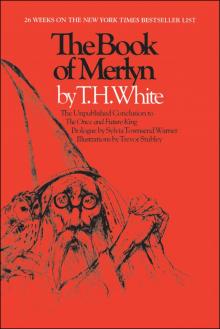- Home
- T. H. White
The Once and Future King (#1-4) Page 40
The Once and Future King (#1-4) Read online
Page 40
‘Oh!’ said Morgan le Fay.
‘Yes,’ said Lancelot.
‘That is all?’
‘Yes.’
The four queens curtsied with frigid dignity, and marched out of the room. The sentries made smart about—turns, their mail ringing on the stone floor. The light went out of the door. The door slammed, and the key creaked, and the bolts rumbled into their sockets.
When the fair damsel came in with the next meal, she showed signs of wanting to talk to him. Lancelot noticed that she was a bold creature, who was probably fond of getting her own way.
‘You said you might be able to help me?’
The girl looked suspiciously at him and said: ‘I can help you if you are who you are supposed to be. Are you really Sir Lancelot?’
‘I am afraid I am.’
‘I will help you,’ she said, ‘if you will help me.’
Then she burst into tears.
While the damsel is weeping, which she did in a charming and determined way, we had better explain about the tournaments which used to take place in Gramarye in the early days. A real tournament was distinct from a joust. In a joust the knights tilted or fenced with each other singly, for a prize. But a tournament was more like a free fight. A body of knights would pick sides, so that there were twenty or thirty on either side, and then they would rush together harum—scarum. These mass battles were considered to be important – for instance, once you had paid your green fee for the tournament, you were admitted on the same ticket to fight in the jousts – but if you had only paid the jousting fee, you were not allowed to fight in the tourney. People were liable to be dangerously injured in the mêlées. They were not bad things altogether, provided they were properly controlled. Unfortunately, in the early days, they were seldom controlled at all.
Merry England in Pendragon’s time was a little like Poor Ould Ireland in O’Connell’s. There were factions. The knights of one county, or the inhabitants of one district, or the retainers of one nobleman, might get themselves into a state in which they felt a hatred for the faction which lived next door. This hatred would become a feud, and then the king or leader of the one place would challenge the leader of the other one to a tourney – and both factions would go to the meeting with full intent to do each other mischief. It was the same in the days of Papist and Protestant, or Stuart and Orangeman, who would meet together with shillelaghs in their hands and murder in their hearts.
‘Why are you crying?’ asked Sir Lancelot.
‘Oh dear,’ sobbed the damsel. ‘That horrid King of Northgalis has challenged my father to a tournament next Tuesday, and he has got three knights of King Arthur’s on his side, and my poor father is bound to lose. I am afraid he will get hurt.’
‘I see. And what is your father’s name?’
‘He is King Bagdemagus.’
Sir Lancelot got up and kissed her politely on the forehead. He saw at once what he was expected to do.
‘Very well,’ he said. ‘If you can rescue me out of this prison, I will fight in the faction of King Bagdemagus next Tuesday.’
‘Oh, thank you,’ said the maiden, wringing out her handkerchief. ‘Now I must go, I am afraid, or they will miss me downstairs.’
Naturally she was not going to help the magic Queen of Northgalis to keep Lancelot in prison – when it was the King of Northgalis himself who was going to fight her father.
In the morning, before the people of the castle had got up, Lancelot heard the heavy door opening quietly. A soft hand was put in his, and he was led out in the darkness. They went through twelve magic doors, until they reached the armoury, and there was all his armour bright and ready. When he had put it on, they went to the stables, and there was his charger scratching on the cobbles with a sparkling shoe.
‘Remember.’
‘Of course,’ he said. And he rode out over the drawbridge into the morning light.
While they had crept through the corridors of Castle Chariot, they had made a plan about meeting King Bagdemagus. Lancelot was to ride to an abbey of white friars which was situated near by, and there he was to meet the damsel – who would, of course, be forced to flee from Queen Morgan because of her treachery in letting him escape. At this abbey they were to wait until King Bagdemagus could be brought over, and then the arrangements for the tournament were to be made. Unfortunately, the Castle Chariot was in the Forest Sauvage, and Lancelot now lost his way to the abbey. He and his horse wandered about all day, bumping against branches, getting tangled in blackberry bushes, and rapidly losing their tempers. In the evening they stumbled on a pavilion of red sendal, with nobody inside.
He got off his horse and looked at the pavilion. There was something queer about it – luxurious as it was in the rooky wood, and without anybody in sight.
‘This is a strange pavilion,’ he thought sadly, for his mind was full of Guenever, ‘but I suppose I may as well stay in it for the night. Either it is here for some adventure or other, in which case I ought to try the adventure, or else the owners have gone away on holiday, and in that case they will not mind my taking shelter for one evening. Anyway, I am lost, and there is nothing else I can do.’
He unharnessed the horse and spancelled him. Then he took off his own armour and hung it neatly on a nearby tree with the shield on top. After this he ate some bread which the girl had given him, drinking water from a stream which ran beside the pavilion, stretched his arms out until the elbows went click, yawned, hit his front teeth with his fist three times, and went to bed. The bed was a sumptuous one with a coverlet of red sendal, to match the tent. Lancelot rolled himself in it, pressed his nose into the silk pillow, kissed it for Guenever, and was fast asleep.
It was moonlight when he woke, and a naked man was sitting on his left foot, trimming his finger—nails.
Lancelot, who had been woken from his love sleep with a start, moved suddenly in the bed when he felt the man. The man, equally surprised at feeling a movement, jumped up and snatched his sword. Lancelot jumped out on the other side of the bed and ran for his own arms, where they were hanging in the tree. The man came after him, waving his blade and trying to get a cut at him from behind. Lancelot reached the tree in safety and swung round with his weapon in his hand. They looked strange and terrible in the moonlight, both stark naked, with their silver steel glancing under the harvest moon.
‘Now,’ cried the man, and he aimed a furious swipe at Lancelot’s legs. The next minute he had dropped his sword and was holding his stomach with both hands, doubled up and whistling. The cut which Lancelot had given welled over with blood which looked black in the moonlight, and you could see some of the insides of the stomach with their secret life laid open.
‘Don’t hit me,’ cried the man. ‘Mercy. Don’t hit me again. You have killed me.’
‘I am sorry,’ said Lancelot. ‘You did not even wait till I had a sword.’
The man went on wailing: ‘Mercy! Mercy!’
Lancelot stuck his blade in the ground and went over to examine the wound.
‘I am not going to hurt you,’ he said. ‘It’s all right. Let me see.’
‘You have cut open my liver,’ said the man accusingly.
‘Well, I can’t do more than say I am sorry, even if I have. I don’t know what we were fighting about anyway. Lean on my shoulder and we will get you into bed.’
When he had got the man to bed, and stopped his bleeding, and discovered that the wound was not a mortal one, a beautiful lady appeared in the opening of the tent. They had lit a rushlight, so that she saw what had happened in a flash, and immediately she began screaming at the top of her voice. She rushed over to comfort the wounded man, and accused Lancelot of being a murderer, and carried on a great deal.
‘Do stop howling,’ said the man. ‘He is not a murderer. We just made a mistake.’
‘I was in bed,’ said Lancelot, ‘when he came and sat on me, and we were both so startled that we had a fight. I am sorry that I hurt him.’
‘But it
was our bed,’ cried the lady, like one of the Three Bears. ‘What were you doing in our bed?’
‘Really,’ he said, ‘I am sorry. There was nobody in the pavilion when I found it, and I was lost and tired, so I thought it would not matter if I took a night’s lodging.’
‘Nor did it matter,’ said the man. ‘You are welcome to a night’s lodging, and I don’t think the wound is going to be a bad one after all. May I inquire your name?’
‘Lancelot.’
‘Well!’ exclaimed the man. ‘There now, my dear, look who I have been fighting. No wonder I got a bit of a chip. I was wondering why my life was spared so easily.’
So they insisted that Lancelot should stay the night, and in the morning they put him on the correct road for the abbey of white friars.
Nothing much came of this encounter in the main story, except that the knight, whose name was Belleus, was introduced to the Round Table by Lancelot as soon as he was well again. He was the kind of generous fellow that Arthur needed, and Lancelot tried to make up for the trouble which he had caused by getting him a seat at the Table.
At the abbey of white friars the fair damsel was waiting in a state of excitement. She was afraid that he might have let her down. His horse’s hoofs, however, had no sooner clattered on the cobbles than she came flying from her tower room to welcome him with delight.
‘Father will be here this evening,’ she cried. ‘Oh, I am so glad you came! I was afraid you might have forgotten.’
Lancelot’s twisted mouth grinned at the word she had chosen to use. Then he changed into civilian dress, had a bath, and waited for King Bagdemagus.
‘It is a puzzling life in Gramarye,’ he said to himself, trying to keep his mind off the young Queen. ‘Things happen so quickly. One hardly knows where one is half the time, and there is that cousin of mine who vanished under the apple tree, who has still to be accounted for. What with magic queens and faction tournaments and people getting into bed with you at night, and half the family vanishing without trace, it is difficult to keep in line.’
Then he brushed his hair, smoothed his gown, and went down to meet King Bagdemagus.
There is no need to give a long description of the tourney. Malory gives it. Lancelot picked three knights who were recommended by the young damsel to go with him, and he arranged that all four of them should bear the vergescu. This was the white shield carried by unfledged knights, and Lancelot insisted on this arrangement because he knew that three of his own brethren of the Round Table were going to fight on the other side. He did not want them to recognize him, because it might cause ill—feeling at court. On the other hand, he felt that it was his duty to fight against them because of the promise which he had given to the damsel. The King of Northgalis, who was the leader of the opposite side, had one hundred and sixty knights in his faction, and King Bagdemagus only had eighty. Lancelot went for the first knight of the Round Table, and put his shoulder out of joint. He went for the second one so hard that the unlucky fellow was carried over his horse’s tail and buried his helm several inches in the ground. He hit the third knight on the head so hard that his nose bled, and his horse ran away with him. By the time he had broken the thigh of the King of Northgalis, everybody could see that to all intents and purposes the tournament was over.
The next thing that happened was that our hero set out to discover what had become of Lionel. He was free to do so, for the first time – for, since the disappearance of his cousin, he had either been imprisoned by the malignant queens or else he had been discharging his obligations to the girl who had rescued him from them. King Bagdemagus got the prize at the tournament before he left, and the damsel was almost tearfully grateful. Everybody said that they would be friends for ever, and that they had only to send each other word if there was anything that anybody could do for anybody in return. Then Lancelot mounted his horse, got his bearing by asking several peasants where he was, and rode off toward the forest of the apple tree where he had lost his cousin. He thought that by making an all—round—the—hat cast at the place where he had last seen his cousin, he might be able to pick up the scent once more, although it was cold.
In the forest of the apple tree, indeed at the very foot of the tree itself, he came across a lady riding a white palfrey. The tree was thought to be a magic one, which was the reason why such a lot of traffic went on round it.
‘Lady,’ said he, ‘do you know of any adventures in this forest?’
‘Plenty,’ she said, ‘if you are man enough to take them on.’
‘I could try.’
‘You look a strong man,’ said the lady. ‘You have a bold look, too, in spite of your ears which stick out so frightfully. If you like, I will take you where the fiercest baron in the world lives, but he is sure to kill you.’
‘Never mind.’
‘I will only take you if you tell me your name. It would be murder to take you unless you are a famous knight.’
‘My name is Lancelot.’
‘I thought it was,’ said the lady. ‘Well, it is lucky it is. According to the things which people are saying about you, you are probably the only knight in the world who can beat the man I am taking you to. His name is Sir Turquine.’
‘Good.’
‘Some say he is a madman. He has sixty—four knights in prison, whom he has captured in single combat, and he spends the time beating them with thorns. If he captures you, he will beat you too, all naked.’
‘He sounds an exciting man to fight.’
‘It is a sort of concentration camp.’
‘That is what I have been getting ready for,’ said Sir Lancelot. ‘It is what Arthur invented the Round Table to prevent.’
‘If I take you to him, you must promise to do something for me afterwards – that is, if you win.’
‘What sort of thing?’ he asked cautiously.
‘You need not be afraid,’ said the lady. ‘It is only to vanquish another knight I know of, who is distressing some damsels.’
‘I will promise that gladly.’
‘Well,’ said the lady, ‘God, He knows how you will get on. Anyway, I will say a prayer for you while you are fighting.’
When they had been riding for some time, they came to a ford like the one at which he had fought the first fight with King Arthur. On the trees round the ford there were hanging rusty helms and melancholy shields – sixty—four of them, with their bends and chevrons and luces hauriant and merles and eagles displayed and lions passant guardant looking desolate and abandoned. The leather of their guiges was green and mildewy. It looked like a gamekeeper’s gallows.
In the middle of the glade, on the chief tree, there hung an enormous copper basin, triumphing over the beaten shields. The latest shield under it was Lionel’s – argent, a bend gules distinguished with some sort of label of cadency.
Lancelot knew what he had to do with this basin, and he did it. He put his helm in position, rode through the dripping leaves to the basin, and beat on it with the butt of his spear until the bottom fell out. Then he and the lady stood still in the forest, which was as if it had been shocked silent by the hideous noise.
Nobody came.
‘His castle is beyond,’ said the lady.
They went to the castle gates in silence, and rode up and down in front of them for half an hour. He took off his helm and gauntlets, and frowned, and bit his finger—nails from anxiety.
After the half—hour was over, a gigantic knight came riding through the forest. He looked so like Sir Carados – the knight who had been slain at the rescue of Gawaine – that Lancelot was startled. Not only was he of the same build, but he also had a bound knight thrown across the saddlebow of his mare. Most peculiar of all, the bound knight’s shield carried the three thistles and the chevron, with a red canton. In fact, the second of the big knights had captured Gaheris – Gawaine’s brother. Lancelot watched him with a critical eye.
It may not be amiss to mention that a good judge of style could often recognize a knig
ht in armour, even if he was disguised and bearing the vergescu. In later life Lancelot sometimes had to fight disguised, because otherwise nobody would fight him. Yet Arthur and others generally guessed him by his riding. People nowadays ran recognize cricketers, even when their faces are too far away to be seen, and so it was then.
Lancelot was a good judge of style, because of his long practice. As soon as he had watched Sir Turquine for a moment or two, he noticed that there was a slight weakness in his seat. He remarked to the lady that unless Turquine sat better, he thought he would be able to rescue the prisoners. As it turned out, Turquine did sit better when it came to the tilt, so that this particular criticism came to nothing – but it throws a sidelight on jousting and may have been worth mentioning.
The riding was the whole thing. If a man had the courage to throw himself into the fullest gallop at the moment of impact, he generally won. Most men faltered a little, so that they were not at their best momentum. This was why Lancelot constantly gained his tilts. He had what Uncle Dap called the élan. Sometimes, when he was in disguise, he would ride clumsily on purpose, showing daylight at his seat. But at the last moment there was always the true dash – so that the onlookers, and frequently his wretched opponent, could exclaim, ‘Ah, Lancelot!’ even before the lance drove home.
‘Fair knight,’ he said, ‘put down that wounded man and let him rest a little. Then we two can prove our strengths.’
Sir Turquine rode up to him, and said through his teeth: ‘If you are a knight of the Round Table, it will give me great pleasure to knock you down first and whack you afterwards. I could do that to you, and your whole table with you.’

 The Once and Future King (#1-4)
The Once and Future King (#1-4) Once & Future King 05 - The Book of Merlyn
Once & Future King 05 - The Book of Merlyn Mistress Masham's Repose
Mistress Masham's Repose Darkness at Pemberley
Darkness at Pemberley The Once and Future King
The Once and Future King The Book of Merlyn
The Book of Merlyn Candle in the Wind
Candle in the Wind